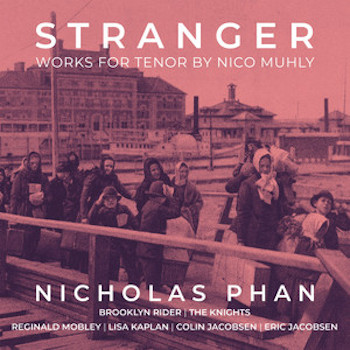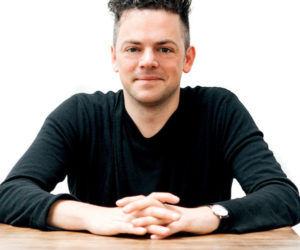Classical Album Review: Nico Muhly’s “Stranger” — Searching for Commonalities
By Jonathan Blumhofer
Nico Muhly’s writing in Stranger is of a type of post-Minimalism: often pulsing (or undulating) and rhythmically driven, though anything but harmonically simplistic.
 “Whatever has happened will happen again,” the writer of Ecclesiastes tells us. Thematically at least, that reality is underlined – sometimes quite potently – on Stranger, a new recording of music by Nico Muhly featuring tenor Nicholas Phan plus, among others, the string quartet Brooklyn Rider and the strings of The Knights.
“Whatever has happened will happen again,” the writer of Ecclesiastes tells us. Thematically at least, that reality is underlined – sometimes quite potently – on Stranger, a new recording of music by Nico Muhly featuring tenor Nicholas Phan plus, among others, the string quartet Brooklyn Rider and the strings of The Knights.
That’s particularly true of the title track, a seven-movement meditation on immigration for tenor and string quartet. In it, Muhly weaves together academic texts, interviews, letters, and biblical injunctions concerning the treatment of newcomers in a strange land. At its most heightened moment – the third-movement setting of an 1879 letter from one Wong Ar Chong to William Lloyd Garrison decrying the hypocrisy (primarily Christian but also political) of treating Chinese immigrants as subhuman – the resonance between past and present is, indeed, startling. Muhly further emphasizes the point in the next movement, with its quotation of the Levitical command to love the stranger “as thyself.”
Thankfully, the larger piece isn’t just an indictment of the United States’ failings to live up to its self-embraced ideals. Rather, Stranger’s overarching focus is on commonalities shared between people regardless of place of origin – a love of food, say, or, in the finale, the joy of sunshine and summer warmth – as well as practical experiences (like eye exams).
Muhly’s writing in Stranger is of a type of post-Minimalism: often pulsing (or undulating) and rhythmically driven, though anything but harmonically simplistic. He doesn’t shy away from aggressive textures – the fifth movement’s central part is plenty gritty – but just as often the music hovers. Everything’s idiomatic, from the instrumental voicings, which are exquisitely navigated by Brooklyn Rider, to the text settings.
Phan, for whom Stranger was written, sings it all magnificently. Each word projects with clarity and intensity, from the recitative-like, syllabic opening movement to the gorgeous, high-tessitura setting of Leviticus and through the furious (timeless?) observations of institutionalized racism.
He’s just as compelling in Impossible Things, Muhly’s setting of poems by C. P. Cavafy for the unlikely combination of tenor, solo violin, and string orchestra. Granted, the solo parts don’t always mesh: in the second-movement duet, when the violin sings (wordlessly) in (mostly) the same rhythms as the voice, the balance is a bit awkward. But when everybody’s in their own place, things tend to click. And that’s the story of much of the rest of the score.

Composer Nico Muhly. Photo: courtesy of the artist
The long first movement, with its blend of warmth and dissonance, offers remarkable textural lucidity. Certain illustrations of the text (like the low string ostinatos and high sighing figures around references to the “perishing world”) are particularly effective and the music’s concluding disintegration is haunting.
Also striking is the finale, which is cast in the form of a passacaglia. Here, the sober structure mirrors Cavafy’s tragic retelling of the execution of an innocent teenager. Violinist Colin Jacobsen’s account of the long violin solo is strict and searing.
Filling out the album is “Lorne Ys My Likinge,” Muhly’s setting of the 19th Chester Mystery Play. Joined by countertenor Reginald Mobley, Phan and pianist Lisa Kaplan make the most of its mix of mystery, violence, and reflection. It’s maybe not the most earth-shaking piece, but the writing is often inventive (the music ends with the singers joining the pianist at the keyboard) and – like Stranger and Impossible Things – plenty affecting.
Jonathan Blumhofer is a composer and violist who has been active in the greater Boston area since 2004. His music has received numerous awards and been performed by various ensembles, including the American Composers Orchestra, Kiev Philharmonic, Camerata Chicago, Xanthos Ensemble, and Juventas New Music Group. Since receiving his doctorate from Boston University in 2010, Jon has taught at Clark University, Worcester Polytechnic Institute, and online for the University of Phoenix, in addition to writing music criticism for the Worcester Telegram & Gazette.
Tagged: Avie, Brooklyn Rider, Jonathan Blumhofer, Nicholas Phan, Nico Muhly

Very nice review.